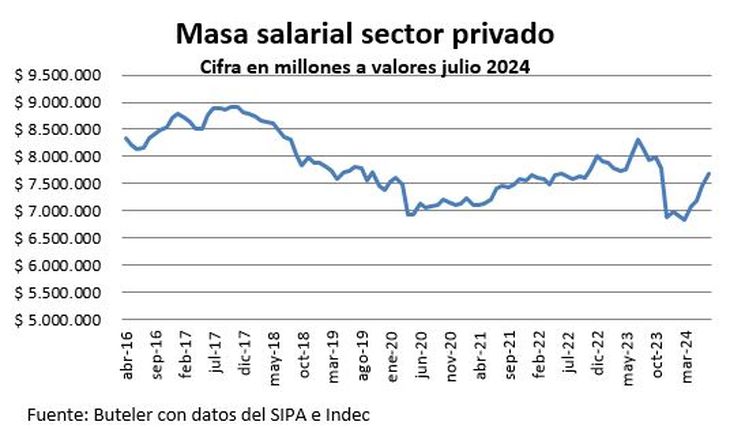He private employment in Argentina continues to declinedefying the expectations of the Government, which had promised stabilization in the labor market. According to the latest report from the Argentine Integrated Pension System (SIPA), prepared by the Ministry of Labor, the data corresponding to July 2024 show that the number of employees in the private sector fell to 6,207 million, with a reduction of 8,900 jobs compared to the previous year. previous month, which is equivalent to a contraction of 0.1% in seasonally adjusted terms.
The negative trend, which began in September 2023, accelerated in the first quarter of 2024. Although the speed of job losses has decreased since then, the accumulated drop since August 2023 amounts to 180,500 positions, implying a reduction of 2.82% in 11 consecutive months of decline.
image.png
Added to this figure are the losses in the public sector, where job destruction began in January of this year. During the first seven months of 2024, 49,400 public sector jobs were cut, bringing the total job losses in the country to 207,900.
Among the private sectors most affected in July are Hotels and restaurants, with a drop of 0.4%; Agriculture, livestock and forestry, with a hiring of 0.3%; and Community Services and Construction, both with a decrease of 0.3%. Setbacks were also recorded in the financial sector, which decreased by 0.3%.
These data are particularly worrying given that economic activity in general registered growth of 1.7% during July, according to the monthly economic activity estimator (EMAE). This mismatch between the rebound in activity and the decline in employment suggests that recent growth has not been enough to drive a sustainable labor market recovery.
Salary behavior and expectations
Despite the drop in jobs, the average salary in the private sector showed an increase of 7.4% in July, standing at $1,234,036. This increase allowed a slight recovery in real terms, in this way the growth in wages compensated for the fall in jobs and the private sector’s wage bill continues to recover.
Clipboard01.jpg

The Labor Indicators Survey (EIL) showed an additional contraction of 0.1% in private employment registered in companies with more than 10 employees in urban agglomerations during August 2024, although the magnitude of the fall was smaller than in previous months. Among sectors, transportation was one of the few to see a level of recovery (0.2%), while others, such as construction and financial services, maintained their levels unchanged.
By company size, employment in medium-sized companies (50-199 employees) grew by 0.1%, but both small (10-49 employees) and large companies (more than 200 employees) registered falls.
Future prospects
Labor demand appears to be at historically low levels, with the search rate for new employees standing at 1.8% in August, below the levels of previous years, with the exception of 2018.
Suspended employment, which had shown a growing trend in recent years, recorded its second consecutive month of decline, approaching pre-pandemic levels. However, layoffs without cause, although they increased slightly in August, remain low compared to previous years.
Despite these challenges, companies’ hiring expectations appear to be improving for the third consecutive month. In August, 5.3% of companies surveyed indicated that they expect to make changes to their workforce over the next three months, and of these, 3.8% anticipate an increase in staff, while only 1.5% expect cuts. This leads to positive net expectations of 2.3%, suggesting a slight improvement on the horizon.
Conclusion
The Argentine labor market faces a considerable challenge. The sustained decline in private employment, together with the difficulties of the public sector, reflects a complex panorama, despite signs of economic recovery. Although real wages have shown some improvement and hiring expectations are moderately optimistic, employment figures indicate that a solid recovery still appears distant.
Private consumption is a fundamental component to drive the recovery of the economy. However, for this consumption to be reactive, it is not only necessary to restore salaries, but also to increase the number of jobs available. This job creation must be driven primarily by the private sector, which has the potential to generate the sustainable growth necessary to consolidate the long-term economic recovery. Public policies should focus on reversing the trend of job destruction, guaranteeing that the rebound in economic activity translates into a strengthening of the labor market.
Financial analyst
Source: Ambito
David William is a talented author who has made a name for himself in the world of writing. He is a professional author who writes on a wide range of topics, from general interest to opinion news. David is currently working as a writer at 24 hours worlds where he brings his unique perspective and in-depth research to his articles, making them both informative and engaging.




